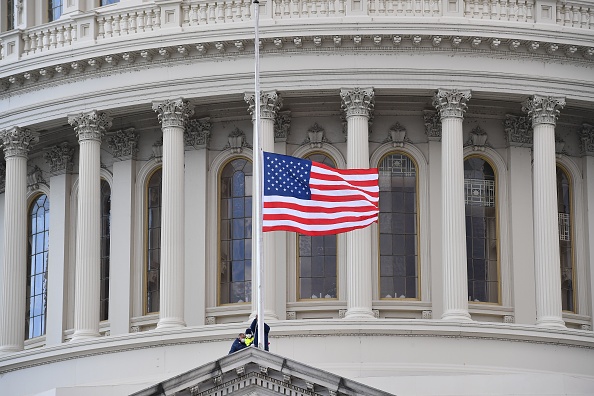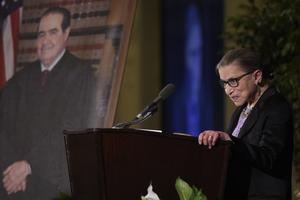Catholic Leaders Say Virtues Are Needed to End America’s ‘Uncivil War’
People of faith must lead with moral goodness to stave the republic from succumbing to the politics of despair fueling violent civil strife.

Before the U.S. Capitol — where just over a fortnight ago U.S. citizens toting pro-Trump paraphernalia took to violent force in an attempt to prevent Congress from confirming the electoral vote — President Joe Biden took the Presidential Oath of Office and extended a call for Americans to work together for unity and healing.
“We’ve learned again that democracy is precious. Democracy is fragile,” the professing Catholic and newly-sworn-in president said in his Jan. 20 inaugural speech. “At this hour, my friends, democracy has prevailed.”
Biden’s remarks also underscored a realization that civic tensions in the U.S. are at a dangerous level and that authentic unity built on truth must be achieved to preserve democratic governance.
“We must end this uncivil war that pits red against blue, rural versus urban, conservative versus liberal. We can do this if we open our souls instead of hardening our hearts,” he said.
During the next term, Catholics in the U.S. will play a critical role in repudiating the vices that have slouched the republic toward civil strife by embracing the virtues needed to heal the country, say some leading Catholic voices.
Robert George, McCormick Professor of Jurisprudence at Princeton University and a leading Catholic intellectual in the United States, told the Register that the extreme political polarization in the United States, replete with “unwillingness to listen to the other side, or give them any credit for being rational human beings, and demonizing anyone who is not part of their tribe” — has dangerous historical parallels. He referred to the 1800 disputed presidential election (waged between President John Adams and Vice President Thomas Jefferson that nearly saw Aaron Burr become president), and “even more frighteningly the political situation of the late 1850s” before the Civil War.
“There is an unwillingness to consider that there may be fault on one’s own side, and I see this across the spectrum: dead certainty that all virtue is on my side, and all vice is on the other side,” he said.
George said Americans need to cultivate honesty, courage, humility and hope in themselves, their children, and (for teachers) in their students, in order to combat the “self-righteousness, hypocrisy and double standards” pervasive in contemporary political discourse.
“People need to be humble enough to open their minds and consider that they can learn something from their critics and those who disagree with them,” he said. “We all need to realize that we’re frail, fallible and, from a Christian point of view, fallen. As a practical matter, if we regard ourselves as infallible, we’ll never learn anything and correct the errors in our own way of thinking.”
George added that hope is a virtue and should not be mistaken for or equated with optimism.
“It’s not a prediction about the way things are going. It’s the recognition that grace is available for us, our own choices and acts, for honesty, courage and love to make the situation better. And hope is what undergirds our capacity for sacrifice for the sake of making things better for justice and the human good.”
Restoring the country’s political health requires Catholics to be “intentional for healing and reconciliation,” Franciscan Father David Pivonka, the president of Franciscan University of Steubenville, told the Register.
“It doesn’t just happen. We have to desire it,” he said. Father Pivonka said Catholics cannot be agents of healing or expect unity to happen if they do not take the initiative to reach out to others. “Otherwise, honestly, we’re not going to get anywhere.”
“It has to be an individual decision each one of us makes that this is important and I as an individual am willing to work for it,” he said. And it requires the virtues of “patience and perseverance,” because it will take time, he added.
Father Pivonka said that changing the country’s political discourse is not some far-off, distant ideal. Rather, it starts at home.
“We ought not look too far off” to practice this, he said, explaining that practicing charity starts with one’s spouse, child, colleagues — people with whom one may disagree politically. “Reach out to somebody you’re separated from,” he said.
Father Pivonka added that Christians also must view politics through the lens of faith, and rather than reveal the temperature of society, “the Christian ought to be the thermostat.”
“We can’t expect the culture to be civil and charitable if we ourselves don’t do that,” he said. Father Pivonka said the danger is for Christians to compare themselves to other groups, whether it is the rioters in Portland or the rioters at the Capitol, but that is not the measure for the Christian.
“The measure for the Christian is Jesus,” he said. “He showed us what it is to be loving, charitable and have a profound impact on the culture.”
“If the civil society is to be transformed,” he said, “it has to be transformed from within.”
Toward a Shared Reality
Menachem Rosensaft, the associate executive vice president of the World Jewish Congress and a human rights attorney who is Jewish and the son of Holocaust survivors, told the Register that it was important for everyone to work together to guide the mainstream “back to an acknowledgement of reality,” where democratic political discourse could take place within a shared set of facts.
Catholics, and other religious leaders as well, he said, have an important model in Pope Francis in how to lead and engage.
“One of the many admirable dimensions of Pope Francis is his ability and willingness to treat non-Catholics as equals in the human family and an insistence on understanding other people’s pain. You may not agree with it, but you at least first understand where other people are coming from,” Rosensaft said.
“Leadership requires a commitment to the whole human family, as opposed to only one’s constituency,” he added, explaining Pope Francis’ approach has allowed him to make a spiritual impact beyond the Catholic or Christian spheres of influence. He hoped others would follow in those footsteps.
“We need to go beyond dealing with our own concerns. ... We cannot afford at this point to react only when it is our particular group being threatened,” he said, pointing out that the history of the 20th century shows what happens when the extremes on the right or the left are allowed to run unchecked. “We’re all in danger when the mindset is an anti-democratic mindset where facts do not matter.”
Catholic commentator Kathryn Jean Lopez, editor-at-large of National Review Online, told the Register that Catholics need to practice the virtue of humility to see reality clearly and also to hear the Gospel truly.
Lopez said Catholics must embrace the virtues of “faith, hope and love” against a “politics of despair” that undergirds those violent outbursts in U.S. cities throughout 2020 and at the Jan. 6 attack on the Capitol.
“We would not have a lot of the problems we have today if Christians were living Christian lives and making the beatitudes their priority instead of their political alliances,” Lopez said.
Listening to Jesus Christ and living each day in his Gospel has to be rooted in a habit of authentic prayer.
“If we’re not spending time with God in prayer and silence, we cannot possibly hear the Gospel,” she said. Being aware of the presence of Christ “changes who we are” and allows people to listen to others and understand them.
“The most important thing we can do is to spend time in prayer,” Lopez said.
Lopez said she prays the Liturgy of the Hours, the public prayer of the universal Church, but said Catholics would do well to pray an abridged version, such as the Magnificat series, reading the Psalms every day or the daily Mass readings.
“I try to wake up in the morning and make the Sign of the Cross to remember who I am and who I belong to,” she said.
Mercy Above All
Charles Camosy, a Catholic theologian at Fordham University in New York, told the Register that most people in the U.S. “don’t fit in the ‘us vs. them’ fight-to-the-death narrative.” But thanks to “profit-obsessed” traditional and social-media companies, “the loudest and most extreme voices are amplified and even regular voices are given the worst possible spin.”
“Fanning the flames of hatred and division and ‘us vs. them’ tribalism, it turns out, pays them well,” he said.
“The virtues don’t make these companies a lot of money. Vices do,” he said, particularly wrath and envy.
Camosy said Americans need to embrace the virtue of mercy and extend it to everyone, “including our perceived enemies.”
“Show mercy to everyone, including yourself. So much of one’s inner wrath and envy comes from a kind of self-hatred — one which these companies play on,” he said.
Above all, he said, Catholics must focus on following Jesus Christ.
“We must be courageous enough to say, ‘He must increase and I must decrease.’ And, building the unity of the virtues, this takes us back to showing mercy,” he said, “for we often find Christ in the very people we perceive to be our enemies if we begin with mercy.”
- Keywords:
- catholics and political life
- political polarization
- virtue
- catholic living
- george weigel
- peter jesserer smith
















